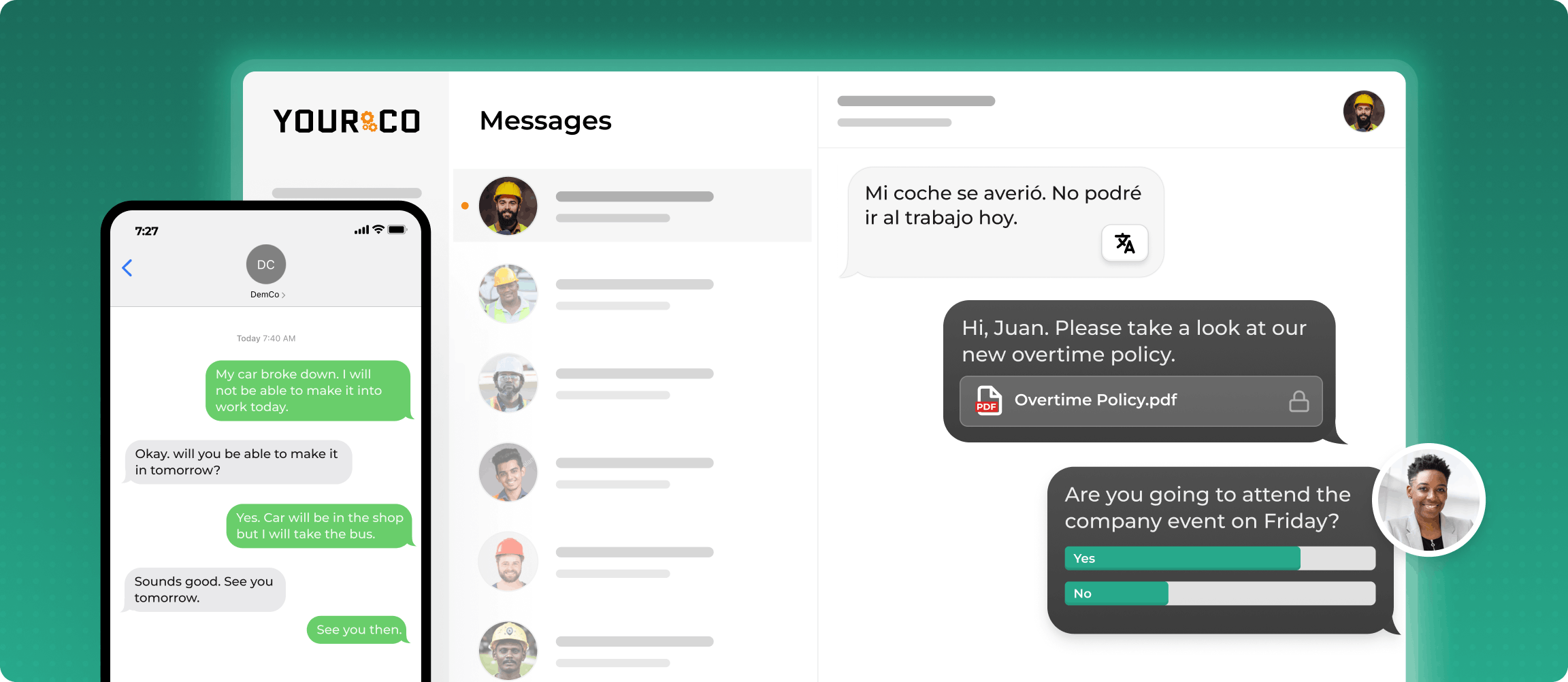Who Are Frontline Workers? Roles, Responsibilities, and Industry Insights


Frontline workers account for over 80% of the global workforce, directly impacting customer satisfaction, operational efficiency, and overall business performance. These team members often create significant value through face-to-face interactions and hands-on roles, yet they're frequently overlooked in corporate communication strategies.
With labor markets tightening and businesses increasingly focused on retention, effectively understanding and engaging frontline employees has become essential.
In this article, you'll learn precisely who frontline workers are, what their core responsibilities entail, and why their role is critical to success across key industries such as healthcare, manufacturing, retail, logistics, and public safety.
Who are Frontline Workers?
Frontline workers are the people who engage directly with customers, products, or services rather than working behind a desk. They're your organization's visible face, the folks who make, deliver, sell, and service your offerings every day.
You'll find them across countless sectors, from healthcare aides and warehouse associates to retail cashiers and field technicians. What connects them? Their physical presence where value happens; on factory floors, at service counters, or by patient bedsides.
Unlike their desk-bound colleagues, frontline staff rarely have computer access during shifts, perform hands-on tasks, and work variable schedules. This matters because traditional corporate communication often misses these teams completely, creating disconnects that hurt operations and morale. Let’s look at the impact in some key industries.
Frontline Workers in Manufacturing & Warehousing
These workers form the backbone of supply chains, with manufacturing alone employing over 12.5 million Americans in trades and supply chain roles. Machine operators keep production equipment running while maintaining quality. Forklift drivers move materials throughout facilities, managing inventory flow. Warehouse pickers fulfill orders by collecting specific items from storage areas.
Frontline Workers in Retail & Hospitality
Cashiers process transactions while handling customer questions and concerns. Housekeepers maintain cleanliness standards that directly impact guest satisfaction and health. Food service staff prepare and serve meals under tight time constraints.
Frontline Workers in Logistics & Transportation
With e-commerce booming, transportation and warehousing jobs have grown by 20% in recent years. This includes delivery drivers who find routes to get packages to destinations on time but also dock workers load and unload freight from ships, trains, and trucks. Meanwhile, field service engineers install and fix equipment at customer sites.
Frontline Workers in Public Safety & Utilities
These workers maintain the infrastructure and safety net that communities depend on. Police officers respond to emergencies and keep communities safe. Firefighters protect lives and property during disasters. Utility repair crews restore services during outages, often in hazardous conditions.
Frontline Workers in Healthcare & Social Services
According to Bureau of Labor Statistics data, healthcare support occupations will grow 16% by 2030, making them among the fastest-growing frontline segments. This includes vital workers like nurses who provide direct patient care under pressure, home health aides who help elderly and disabled individuals with daily activities, and emergency medical technicians (EMTs) who deliver care during transport, often in unpredictable situations.
Core Roles & Responsibilities of Frontline Workers
Frontline workers power the everyday operations that keep businesses functioning. Their work includes:
- Serving Customers: They interact with customers face-to-face, answering questions, solving problems, and creating positive experiences. These interactions build the company's reputation with every conversation.
- Operating Equipment: From complex machinery to simple tools, frontline workers use specific equipment to do their jobs. They often become experts at troubleshooting common issues before they become bigger problems.
- Problem-Solving: When something unexpected happens, like a customer complaint, equipment breakdown, or delivery issue, frontline workers make quick decisions without always having time to check with managers. Their judgment directly affects both customer satisfaction and operational results.
- Maintaining Quality & Safety: Frontline workers apply quality standards to products and services while watching for safety concerns. They follow protocols that protect themselves, customers, and the company from risks.
- Sharing Important Information: Through shift handoffs, incident reports, and team huddles, frontline workers pass along valuable information. They track what they've accomplished, flag issues, and collaborate with coworkers, often in person rather than through email or chat.
Impact of Frontline Workers on Business Operations
Frontline workers shape customer experiences in countless ways. When shoppers interact with helpful, knowledgeable staff, they're more likely to return and recommend the business to others. Research by PwC shows 73% of consumers consider experience a major factor in purchasing decisions. The quality of these interactions influences customer loyalty significantly.
Efficiency Gains
These workers also determine how efficiently a business runs. When properly staffed shifts operate smoothly, productivity measures like production volume, customer wait times, and delivery completion rates improve. Conversely, when communication breaks down or positions remain unfilled, operations suffer immediately.
Implementing effective employee communication strategies can prevent these issues. Frontline workers often spot inefficiencies firsthand and can suggest practical manufacturing productivity improvements based on their daily experiences.
Financial Benefits
The financial health of many businesses ties directly to frontline performance. Accurate timekeeping affects labor costs, while productivity impacts profit margins. When frontline operations run well, companies avoid costly overtime, reduce waste, and maximize revenue opportunities.
Regulatory Compliance
Frontline teams also play a huge role in keeping companies compliant with regulations. Their daily documentation, from temperature logs in restaurants to safety checklists in factories, provides records that regulators require. Accurate incident reporting and proper procedure following help companies avoid fines and legal issues that could damage both finances and reputation.
Support Strategies & Tools for Frontline Worker Engagement
To support and engage your frontline workforce, it's essential to focus on enhancing frontline benefits and communication tools.
SMS-Based Communication
Text messaging has become the ideal channel for frontline communication. With no app downloads needed, SMS reaches workers regardless of smartphone ownership or data plans, making it ideal for mobile-first communication.
Dedicated call-off hotlines via text let employees report absences without complicated phone systems. These SMS-based communication tools simplify processes and improve efficiency. Using a reliable text messaging service for business ensures messages are delivered promptly and securely.
AI-Powered Translations
Workforce diversity requires multilingual communication. Automatic translation ensures important messages reach all employees in their preferred languages, reducing errors and improving compliance while avoiding the high costs associated with professional translation services.
Integrated Scheduling Alerts
When frontline scheduling systems connect with HR and payroll platforms, businesses eliminate manual data entry. Call-offs, approved time off, and shift swaps automatically update relevant systems, preventing scheduling gaps and timecard errors.
Two-Way Polling & Surveys
Regular feedback is essential for improving team communication and helps identify issues before they become problems. Simple text-based polls about safety concerns, morale, or training needs can achieve response rates over 50%. Choosing effective survey distribution methods can maximize response rates and gather valuable insights.
Secure Document Access
Digital distribution of operating procedures, safety checklists, and training materials ensures everyone works from the latest information. Secure file delivery via SMS allows frontline workers to access important documents without company laptops or complex logins, ensuring secure business communication.
Robust Security Features
Maintaining secure communication is critical for frontline teams. Features such as end-to-end encryption, role-based access control, and passwordless authentication protect sensitive employee information. Additionally, dedicated communication numbers reduce phishing risks, and comprehensive message logging ensures compliance and audit readiness. These security measures provide peace of mind, keeping your operational data safe from unauthorized access.
Yourco combines all these essential tools into one powerful SMS-based communication platform, purpose-built for the frontline workforce. With Yourco, you have seamless multilingual messaging, integrated scheduling alerts, real-time surveys, secure document delivery, and enterprise-grade security, enabling your organization to foster deeper employee engagement, streamline operations, and enhance overall workplace efficiency.
5 Best Practices to Empower Frontline Workers
Implementing effective engagement strategies for frontline workers is essential to empower them and improve overall performance.
1. Establish Clear Communication Protocols
Set specific timeframes for absence reporting (e.g., at least 4 hours before shift start) and create simple escalation paths for issues. Document these expectations in plain language without corporate jargon.
2. Implement Regular Check-Ins
Organizations that conduct regular pulse surveys see 14.9% lower turnover rates. Weekly pulse surveys take less than a minute to complete via text. Questions might cover immediate concerns like equipment functionality or safety observations. Share summarized results with local managers to drive improvements.
3. Develop Recognition Programs
Public recognition ties directly to higher engagement, with recognized employees showing 56% better health and wellness. Use text notifications to acknowledge achievements, from safety milestones to work anniversaries. Implementing incentives for deskless teams can further motivate employees and enhance performance.
4. Deliver Continuous Microlearning
Microlearning improves knowledge retention by 17% compared to traditional training. Send brief training modules or quick knowledge checks via text to reinforce procedures without disrupting workflows. This approach respects frontline time constraints while improving compliance.
5. Close the Feedback Loop
When frontline workers provide input, act on it visibly and report back on changes. This creates a cycle where employees see the value of their contributions, leading to more engagement and better suggestions.
Connect and Thrive: The Frontline Advantage

Frontline workers drive operational success by shaping customer experiences and ensuring businesses consistently deliver on their brand promises. Yet, as this article highlights, traditional communication methods often leave frontline teams disconnected, impacting morale, efficiency, and compliance. Yourco addresses these challenges directly, providing a robust SMS-based platform specifically designed for frontline communication. By eliminating barriers such as limited internet access, app downloads, or language differences, Yourco delivers essential updates, operational alerts, and training materials straight to employees' mobile phones in their preferred languages. It simplifies absence reporting, enhances two-way communication, and ensures critical information reaches teams instantly, enabling swift problem-solving and improved safety practices. Seamless integrations with existing HR and payroll systems further streamline workflows, minimizing manual data entry and reducing errors. Yourco empowers organizations to effectively engage their frontline employees, driving productivity, compliance, and employee satisfaction.
Try Yourco for free today or schedule a demo and see the difference the right workplace communication solution can make in your company.



